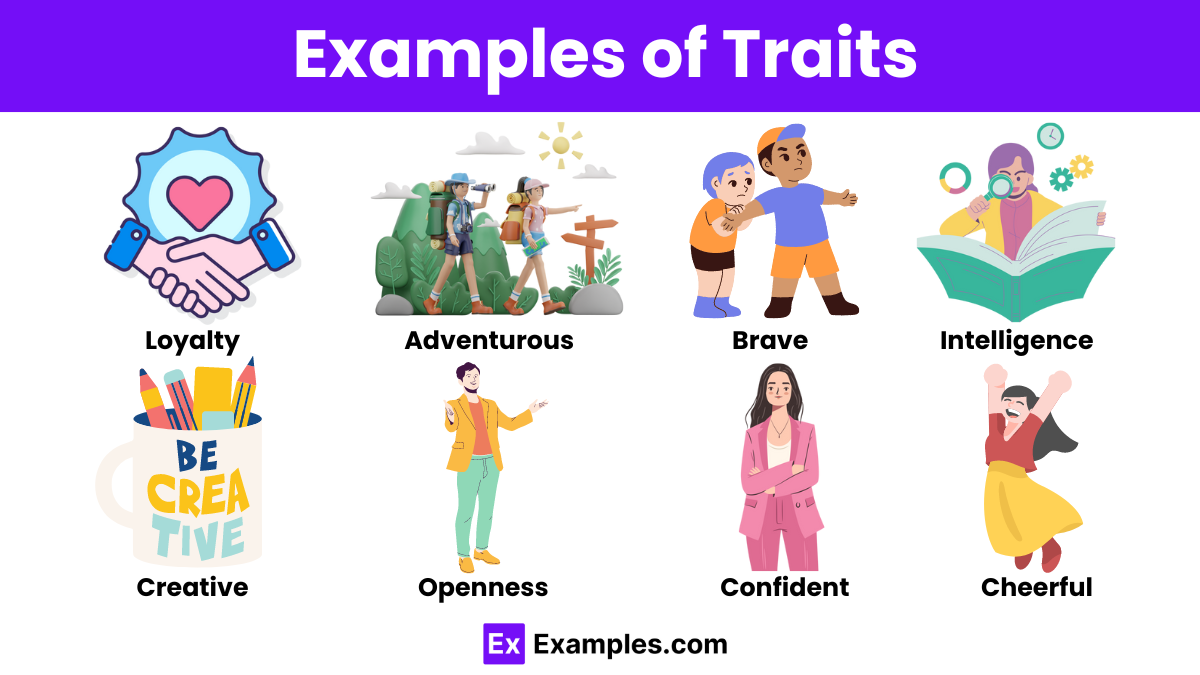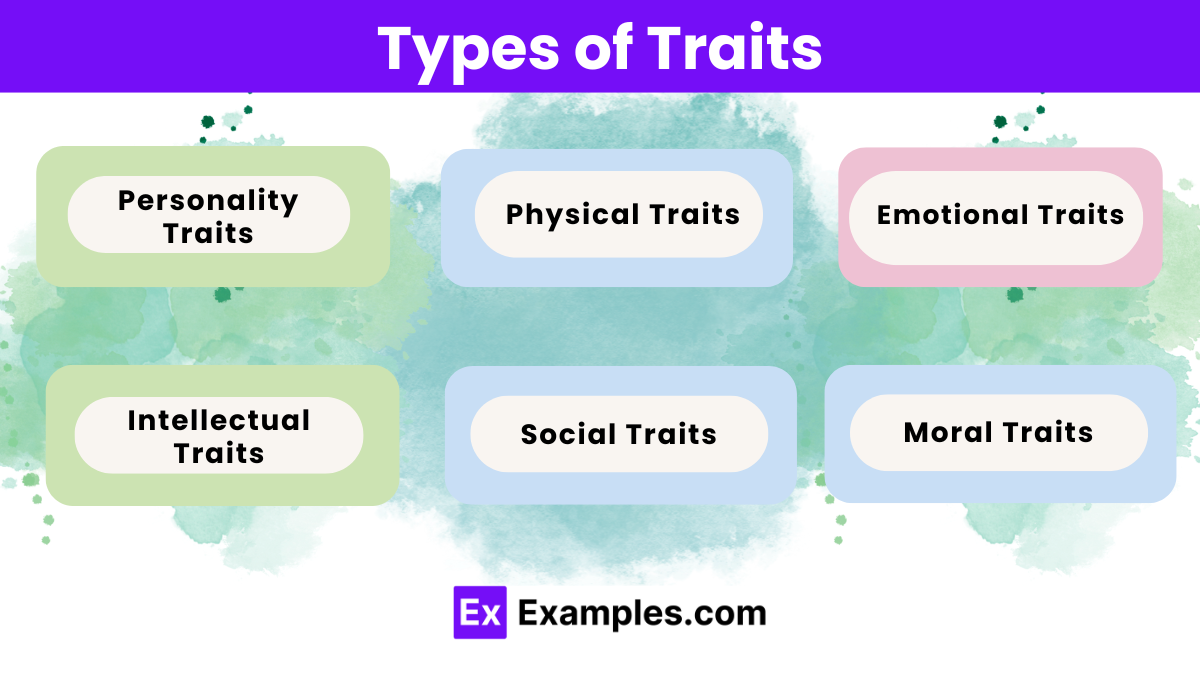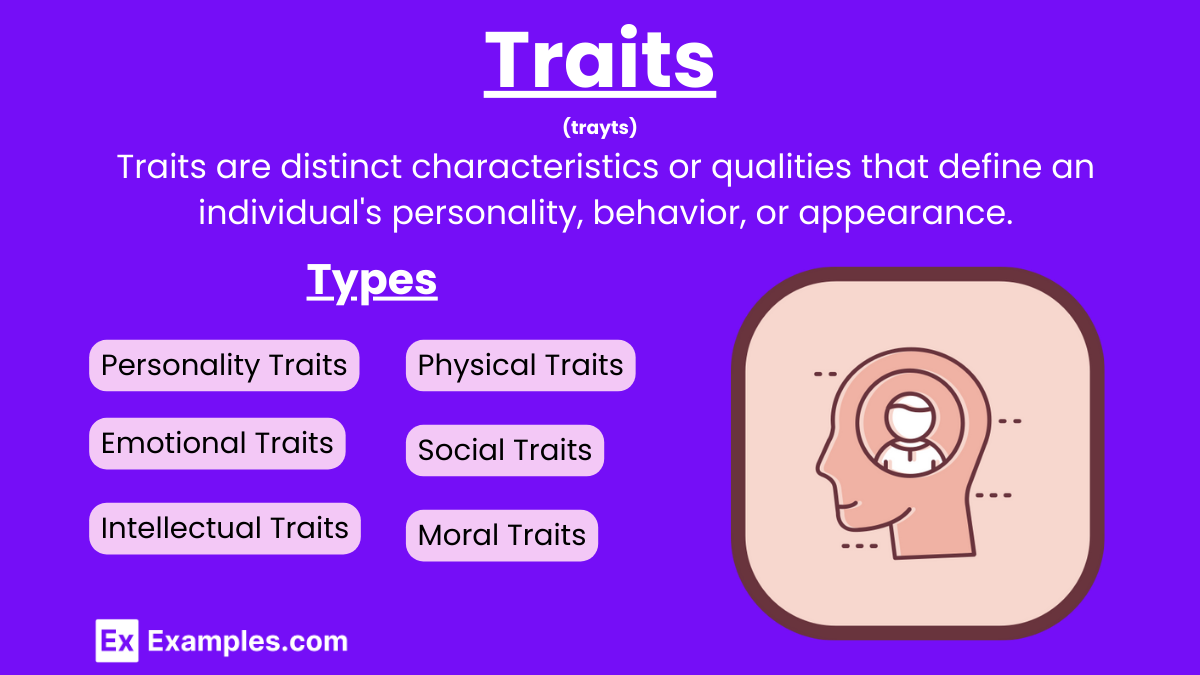24+ Traits Examples
Traits are distinguishing qualities or characteristics of a person, animal, or object. These attributes can be inherent or acquired and help define an individual’s or entity’s behavior, appearance, and personality. Traits can be physical (such as eye color or height) or behavioral (such as kindness or aggression) and are often used to describe and differentiate between different beings or objects. Personality traits are specific characteristics that describe a person’s behavior and attitude. Understanding the characteristics of passive communication can highlight traits such as avoidance of conflict and reluctance to express personal needs. Additionally, in literature, a foil character is one who contrasts with another character, typically the protagonist, to highlight particular qualities and traits of the main character.
What are Traits?
Traits are distinct characteristics or qualities that define an individual’s personality, behavior, or appearance. These attributes can be inherited or acquired and help distinguish one person from another. Traits can encompass a wide range of aspects, such as physical features, like eye color and height, as well as personality aspects, like kindness, assertiveness, and creativity. Metaphors for personality traits often vividly illustrate these characteristics, such as describing someone as “a rock” to signify stability and reliability. In contrast, narcissistic behavior reflects traits of excessive self-admiration and a lack of empathy for others. Using a simile to describe a person, like “as brave as a lion” or “as gentle as a dove,” can provide a clearer and more relatable understanding of their personality.
Examples of Traits

- Conscientiousness
- Agreeableness
- Loyalty
- Compassionate
- Adventurous
- Honest
- Neuroticism
- Cheerful
- Brave
- Confident
- Openness
- Persistent
- Creative
- Intelligence
- Active
- Flexible
- Ambitious
- Extraversion
- Calm
- Accountability
- Determined
- Kind
- Articulate
- Jealous
Types of Traits

1. Personality Traits
- Description: Characteristics that define an individual’s behavior, emotions, and thoughts.
- Examples: Extroversion, agreeableness, conscientiousness, neuroticism, openness to experience.
2. Physical Traits
- Description: Observable attributes of an individual’s physical appearance.
- Examples: Height, eye color, hair color, facial features, body type.
3. Emotional Traits
- Description: Characteristics that define how an individual experiences and expresses emotions.
- Examples: Empathy, resilience, mood stability, optimism, sensitivity.
4. Intellectual Traits
- Description: Attributes related to cognitive abilities and intellectual functioning.
- Examples: Creativity, analytical thinking, problem-solving skills, memory, intellectual curiosity.
5. Social Traits
- Description: Characteristics that influence how an individual interacts with others.
- Examples: Sociability, communication skills, leadership, cooperation, empathy.
6. Moral Traits
- Description: Attributes that reflect an individual’s ethical beliefs and behavior.
- Examples: Honesty, integrity, fairness, responsibility, compassion.
Personality Traits
- Extroversion: Sociable, outgoing, and energetic.
- Agreeableness: Cooperative, compassionate, and friendly.
- Conscientiousness: Organized, responsible, and diligent.
- Neuroticism: Prone to emotional instability and negative emotions.
- Openness to Experience: Creative, curious, and open to new ideas.
- Optimism: Positive outlook on life and future.
- Resilience: Ability to recover quickly from difficulties.
- Empathy: Understanding and sharing the feelings of others.
- Assertiveness: Confidently expressing one’s opinions and needs.
- Flexibility: Willingness to adapt to new situations and changes.
Positive Traits
- Honesty: Being truthful and transparent.
- Loyalty: Showing strong allegiance and support.
- Integrity: Adhering to moral and ethical principles.
- Empathy: Understanding and sharing the feelings of others.
- Patience: Remaining calm and composed in difficult situations.
- Optimism: Having a positive outlook and expecting good outcomes.
- Resilience: Recovering quickly from setbacks and adversity.
- Dependability: Being reliable and trustworthy.
- Kindness: Being considerate, generous, and compassionate.
- Creativity: Thinking innovatively and generating new ideas.
- Diligence: Showing persistent effort and hard work.
- Adaptability: Adjusting easily to new conditions and changes.
Traits for Students
- Curiosity: Eager to learn and ask questions.
- Perseverance: Persisting through challenges and difficulties.
- Responsibility: Being accountable for one’s actions and duties.
- Time Management: Effectively organizing and balancing study time and other activities.
- Respectfulness: Showing respect to teachers, peers, and oneself.
- Critical Thinking: Analyzing and evaluating information logically.
- Adaptability: Adjusting to new situations and environments smoothly.
- Collaboration: Working well with others in group settings.
- Self-Motivation: Driven to achieve goals without needing external encouragement.
- Integrity: Adhering to moral and ethical principles in academic work.
- Creativity: Thinking outside the box and approaching problems in innovative ways.
Unique Traits
- Innovativeness: Consistently creating new ideas and solutions.
- Visionary Thinking: Seeing the bigger picture and planning for the future.
- Authenticity: Being genuine and true to oneself.
- Multitasking: Efficiently managing multiple tasks at once.
- Ambidexterity: Skillfully using both hands equally.
- Altruism: Selflessly helping others without expecting anything in return.
- Synesthesia: Experiencing one sense through another (e.g., seeing sounds).
- Photographic Memory: Recalling images, sounds, or objects in great detail.
- Intuitive Insight: Understanding things instinctively without the need for conscious reasoning.
- Charisma: Possessing a magnetic charm that attracts and influences others.
- Strategic Mindset: Thinking ahead and planning effectively to achieve long-term goals.
Toxic Traits
- Manipulativeness: Using deceit or control tactics to influence others for personal gain.
- Narcissism: Having an inflated sense of self-importance and a lack of empathy for others.
- Dishonesty: Frequently lying or being untruthful.
- Negativity: Consistently having a pessimistic or critical outlook.
- Jealousy: Being envious of others’ successes and possessions.
- Blame Shifting: Avoiding responsibility by placing blame on others.
- Controlling Behavior: Trying to dominate or control others’ actions and decisions.
- Gossiping: Spreading rumors or talking negatively about others behind their backs.
- Selfishness: Prioritizing one’s own needs and desires above those of others.
- Resentfulness: Holding onto grudges and harboring ill will.
- Unreliability: Frequently breaking promises and failing to meet commitments.
Inherited Traits
Physical Traits
- Eye Color: The color of an individual’s eyes, determined by genetic inheritance from parents.
- Hair Color: The natural color of an individual’s hair, which can range from blonde to brown, black, or red.
- Height: The stature of an individual, significantly influenced by the genetic makeup inherited from both parents.
- Skin Tone: The pigmentation of an individual’s skin, passed down through generations.
- Facial Features: Characteristics such as the shape of the nose, lips, and cheekbones.
Health-Related Traits
- Blood Type: A, B, AB, or O blood type, inherited from parents.
- Genetic Disorders: Conditions such as cystic fibrosis, sickle cell anemia, and Huntington’s disease that are passed from parents to offspring.
- Metabolism Rate: The rate at which an individual’s body converts food into energy, influenced by genetics.
- Allergies: Susceptibility to certain allergens, which can be inherited.
Behavioral Traits
- Temperament: The basic aspects of an individual’s personality, such as moodiness or sociability, which can be influenced by genetic factors.
- Intelligence: Cognitive abilities and potential, which have a genetic component.
- Risk-Taking: A propensity for taking risks, which can be partly inherited.
Sensory Traits
- Taste Sensitivity: The ability to perceive certain tastes more strongly, which can be genetically determined.
- Hearing Ability: The sharpness of hearing, which can be influenced by inherited factors.
Uses of Traits
- Self-Awareness and Personal Development: Understanding one’s traits helps individuals gain self-awareness. Recognizing strengths and weaknesses allows for personal growth and the development of skills and behaviors that enhance overall well-being and effectiveness.
- Career Choice and Advancement: Traits are important in career planning and advancement. Certain traits, such as leadership, creativity, and resilience, are better suited for specific professions. Matching personal traits with career requirements can lead to job satisfaction and success.
- Building Relationships: Traits influence how individuals interact with others. Traits such as empathy, kindness, and communication skills are essential for building and maintaining healthy relationships in personal and professional settings.
- Leadership and Management: Effective leaders possess traits such as decisiveness, integrity, and emotional intelligence. These traits enable them to inspire, motivate, and guide their teams towards achieving organizational goals.
- Team Dynamics and Collaboration: Understanding the traits of team members can enhance collaboration and team dynamics. Traits such as cooperation, reliability, and adaptability contribute to a positive and productive team environment.
- Conflict Resolution: Traits like patience, empathy, and assertiveness are crucial for resolving conflicts. These traits help individuals navigate disagreements and find mutually beneficial solutions.
- Motivation and Goal Setting: Traits such as ambition, perseverance, and self-discipline drive individuals to set and achieve goals. These traits are essential for personal and professional success.
- Customer Service and Client Relations: In customer-facing roles, traits like friendliness, empathy, and problem-solving abilities are vital. They ensure positive interactions with clients and enhance customer satisfaction.
What is the difference between dominant and recessive traits?
Dominant traits appear when at least one dominant allele is present, while recessive traits require two recessive alleles to manifest.
Can environmental factors influence traits?
Yes, environmental factors can influence traits by affecting gene expression and phenotypic outcomes.
What is a genotype?
A genotype is an organism’s complete set of genes, representing its genetic makeup.
What is a phenotype?
A phenotype is the observable physical and behavioral characteristics of an organism, influenced by its genotype and environment.
What are polygenic traits?
Polygenic traits are controlled by multiple genes, resulting in a range of phenotypes, such as height or skin color.
How do mutations affect traits?
Mutations can alter genes, leading to new traits or changes in existing traits, which can be beneficial, harmful, or neutral.
What are quantitative traits?
Quantitative traits are measurable traits that vary continuously, like weight, height, or intelligence.
What is a Mendelian trait?
A Mendelian trait follows simple inheritance patterns described by Gregor Mendel, typically involving single genes with dominant and recessive alleles.
How do geneticists study traits?
Geneticists study traits through experiments, genetic mapping, and analyzing inheritance patterns in families or populations.
What is a genetic marker?
A genetic marker is a DNA sequence with a known location, used to identify genes associated with specific traits.



